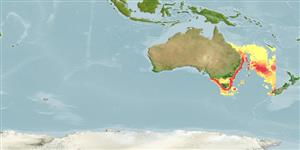Common names from other countries
Environment: milieu / climate zone / depth range / distribution range
Ecología
marino; agua dulce; salobre bentopelágico; catadromo (Ref. 9258); rango de profundidad 0 - 3000 m (Ref. 86942). Subtropical; 18°S - 47°S, 140°E - 168°E
Southwest Pacific: east coast of Australia and New Zealand, extending north to New Caledonia. Museum records from Fiji and Tahiti are doubtful. Australian and New Zealand forms sometimes recognized as subspecies. Most easily confused with Anguilla obscura and the surest way of distinguishing them is to count the vertebrae. Reported from Western and American Samoa (Ref. 592).
Tamaño / Peso / Age
Maturity: Lm ? range ? - ? cm
Max length : 130 cm TL macho / no sexado; (Ref. 40637); 106.5 cm TL (female); common length : 45.0 cm TL macho / no sexado; (Ref. 9258); common length :65 cm TL (female); peso máximo publicado: 7.5 kg (Ref. 40637); edad máxima reportada: 32 años (Ref. 6390)
Occurs in streams, lakes and swamps. More likely inhabits slow flowing streams or still waters (Ref. 26509). Feeds on fishes, crustaceans, mollusks, worms, aquatic plants, and terrestrial and aquatic insects. This species does not breed outside its Pacific spawning ground. Migrates to the sea to breed (Ref. 9258). Maximum length for female eel taken from Ref. 6390. Migrating females in Lake Ellesmere (Canterbury, New Zealand) were reported to be in the range of 48.3 to 102.4 cm, larger than for males 33.8 to 55.4 cm (Ref. 44724). Despite its slimy appearance, its flesh is of excellent quality, considered a delicacy in many countries; meat suitable for smoking (Ref. 33839).
Allen, G.R., 1989. Freshwater fishes of Australia. T.F.H. Publications, Inc., Neptune City, New Jersey. (Ref. 5259)
IUCN Red List Status (Ref. 130435)
CITES (Ref. 128078)
Not Evaluated
Threat to humans
Harmless
Human uses
Pesquerías: comercial; Acuicultura: comercial; pesca deportiva: si
Más información
ReferenciasAcuiculturaPerfil de acuiculturaRazasGenéticaElectrophoresesheritabilidadEnfermedadesProcesamientoMass conversion
Herramientas
Special reports
Download XML
Fuentes de Internet
Estimates based on models
Preferred temperature (Ref.
115969): 4.3 - 9.1, mean 5.3 (based on 57 cells).
Phylogenetic diversity index (Ref.
82804): PD
50 = 0.5000 [Uniqueness, from 0.5 = low to 2.0 = high].
Bayesian length-weight: a=0.00068 (0.00054 - 0.00085), b=3.16 (3.11 - 3.21), in cm Total Length, based on LWR estimates for this species (Ref.
93245).
Nivel trófico (Ref.
69278): 4.3 ±0.5 se; based on diet studies.
Resiliencia (Ref.
120179): Bajo, población duplicada en un tiempo mínimo de 4.5-14 años (tm=8-30; Fec=3,000,000).
Fishing Vulnerability (Ref.
59153): Very high vulnerability (78 of 100).
